Authenticity, Culture, and Power: Giving and Receiving Hospitality
VerifiedAdded on 2023/04/20
|6
|1699
|60
Essay
AI Summary
This essay examines the critical roles of authenticity, culture, and power in the hospitality industry, focusing on how these elements influence both the giving and receiving of hospitality. It highlights that customers increasingly seek authentic experiences, making authenticity a key component in training employees and providing unique, welcoming services. The essay also discusses the significant influence of culture, emphasizing the challenges and necessities of understanding diverse customer backgrounds and adapting business practices to foreign markets. Furthermore, it explores the impact of power dynamics within hospitality businesses, noting how managers can use authority to control operations, motivate employees, and enhance the overall customer experience. The integration of luxury experiences and the strategic use of language are presented as methods to elevate hospitality and foster customer loyalty, ultimately suggesting that a comprehensive understanding of authenticity, culture, and power is essential for success in the competitive hospitality sector. Desklib provides a platform to access this essay and many other resources.
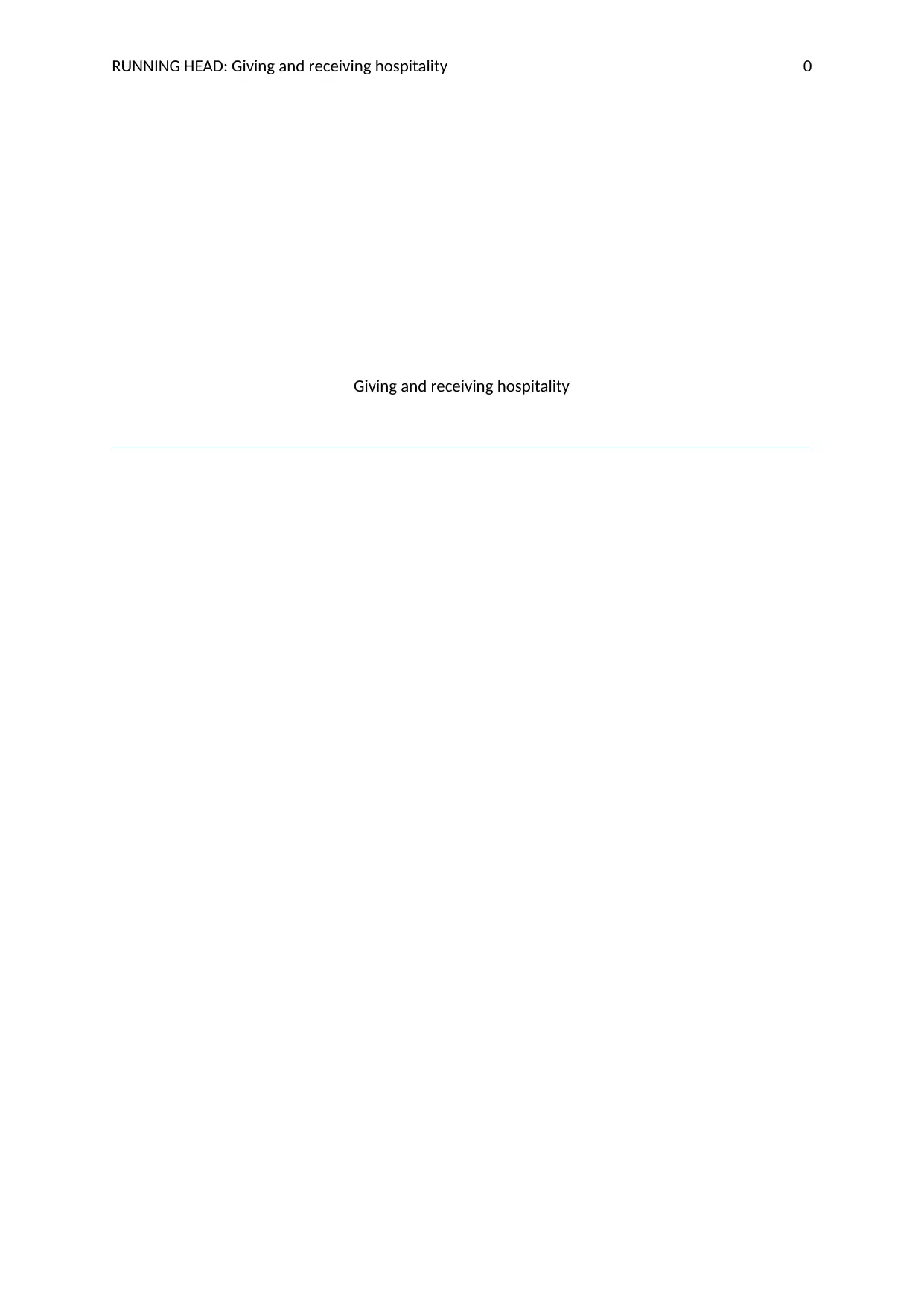
RUNNING HEAD: Giving and receiving hospitality 0
Giving and receiving hospitality
Giving and receiving hospitality
Paraphrase This Document
Need a fresh take? Get an instant paraphrase of this document with our AI Paraphraser
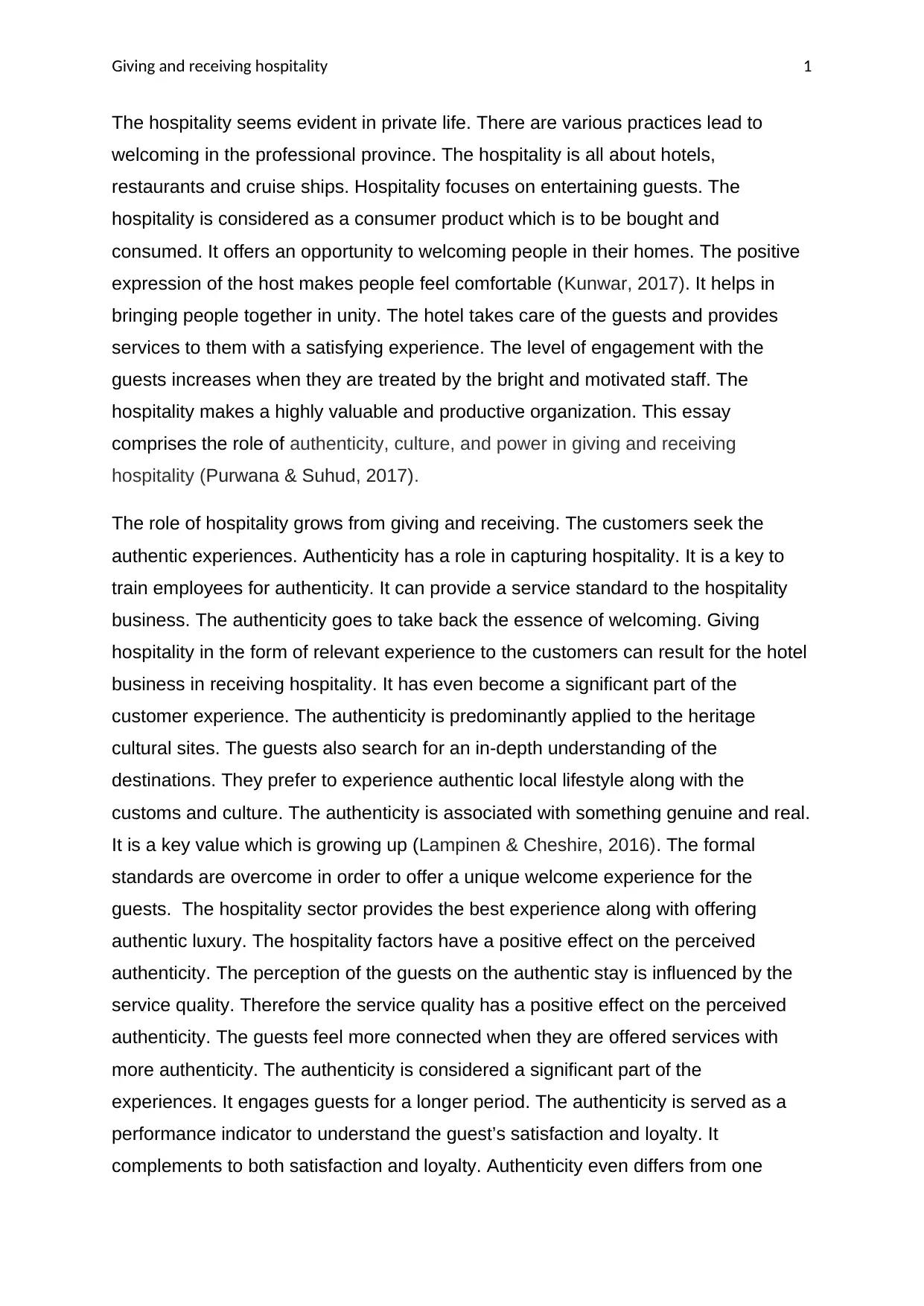
Giving and receiving hospitality 1
The hospitality seems evident in private life. There are various practices lead to
welcoming in the professional province. The hospitality is all about hotels,
restaurants and cruise ships. Hospitality focuses on entertaining guests. The
hospitality is considered as a consumer product which is to be bought and
consumed. It offers an opportunity to welcoming people in their homes. The positive
expression of the host makes people feel comfortable (Kunwar, 2017). It helps in
bringing people together in unity. The hotel takes care of the guests and provides
services to them with a satisfying experience. The level of engagement with the
guests increases when they are treated by the bright and motivated staff. The
hospitality makes a highly valuable and productive organization. This essay
comprises the role of authenticity, culture, and power in giving and receiving
hospitality (Purwana & Suhud, 2017).
The role of hospitality grows from giving and receiving. The customers seek the
authentic experiences. Authenticity has a role in capturing hospitality. It is a key to
train employees for authenticity. It can provide a service standard to the hospitality
business. The authenticity goes to take back the essence of welcoming. Giving
hospitality in the form of relevant experience to the customers can result for the hotel
business in receiving hospitality. It has even become a significant part of the
customer experience. The authenticity is predominantly applied to the heritage
cultural sites. The guests also search for an in-depth understanding of the
destinations. They prefer to experience authentic local lifestyle along with the
customs and culture. The authenticity is associated with something genuine and real.
It is a key value which is growing up (Lampinen & Cheshire, 2016). The formal
standards are overcome in order to offer a unique welcome experience for the
guests. The hospitality sector provides the best experience along with offering
authentic luxury. The hospitality factors have a positive effect on the perceived
authenticity. The perception of the guests on the authentic stay is influenced by the
service quality. Therefore the service quality has a positive effect on the perceived
authenticity. The guests feel more connected when they are offered services with
more authenticity. The authenticity is considered a significant part of the
experiences. It engages guests for a longer period. The authenticity is served as a
performance indicator to understand the guest’s satisfaction and loyalty. It
complements to both satisfaction and loyalty. Authenticity even differs from one
The hospitality seems evident in private life. There are various practices lead to
welcoming in the professional province. The hospitality is all about hotels,
restaurants and cruise ships. Hospitality focuses on entertaining guests. The
hospitality is considered as a consumer product which is to be bought and
consumed. It offers an opportunity to welcoming people in their homes. The positive
expression of the host makes people feel comfortable (Kunwar, 2017). It helps in
bringing people together in unity. The hotel takes care of the guests and provides
services to them with a satisfying experience. The level of engagement with the
guests increases when they are treated by the bright and motivated staff. The
hospitality makes a highly valuable and productive organization. This essay
comprises the role of authenticity, culture, and power in giving and receiving
hospitality (Purwana & Suhud, 2017).
The role of hospitality grows from giving and receiving. The customers seek the
authentic experiences. Authenticity has a role in capturing hospitality. It is a key to
train employees for authenticity. It can provide a service standard to the hospitality
business. The authenticity goes to take back the essence of welcoming. Giving
hospitality in the form of relevant experience to the customers can result for the hotel
business in receiving hospitality. It has even become a significant part of the
customer experience. The authenticity is predominantly applied to the heritage
cultural sites. The guests also search for an in-depth understanding of the
destinations. They prefer to experience authentic local lifestyle along with the
customs and culture. The authenticity is associated with something genuine and real.
It is a key value which is growing up (Lampinen & Cheshire, 2016). The formal
standards are overcome in order to offer a unique welcome experience for the
guests. The hospitality sector provides the best experience along with offering
authentic luxury. The hospitality factors have a positive effect on the perceived
authenticity. The perception of the guests on the authentic stay is influenced by the
service quality. Therefore the service quality has a positive effect on the perceived
authenticity. The guests feel more connected when they are offered services with
more authenticity. The authenticity is considered a significant part of the
experiences. It engages guests for a longer period. The authenticity is served as a
performance indicator to understand the guest’s satisfaction and loyalty. It
complements to both satisfaction and loyalty. Authenticity even differs from one
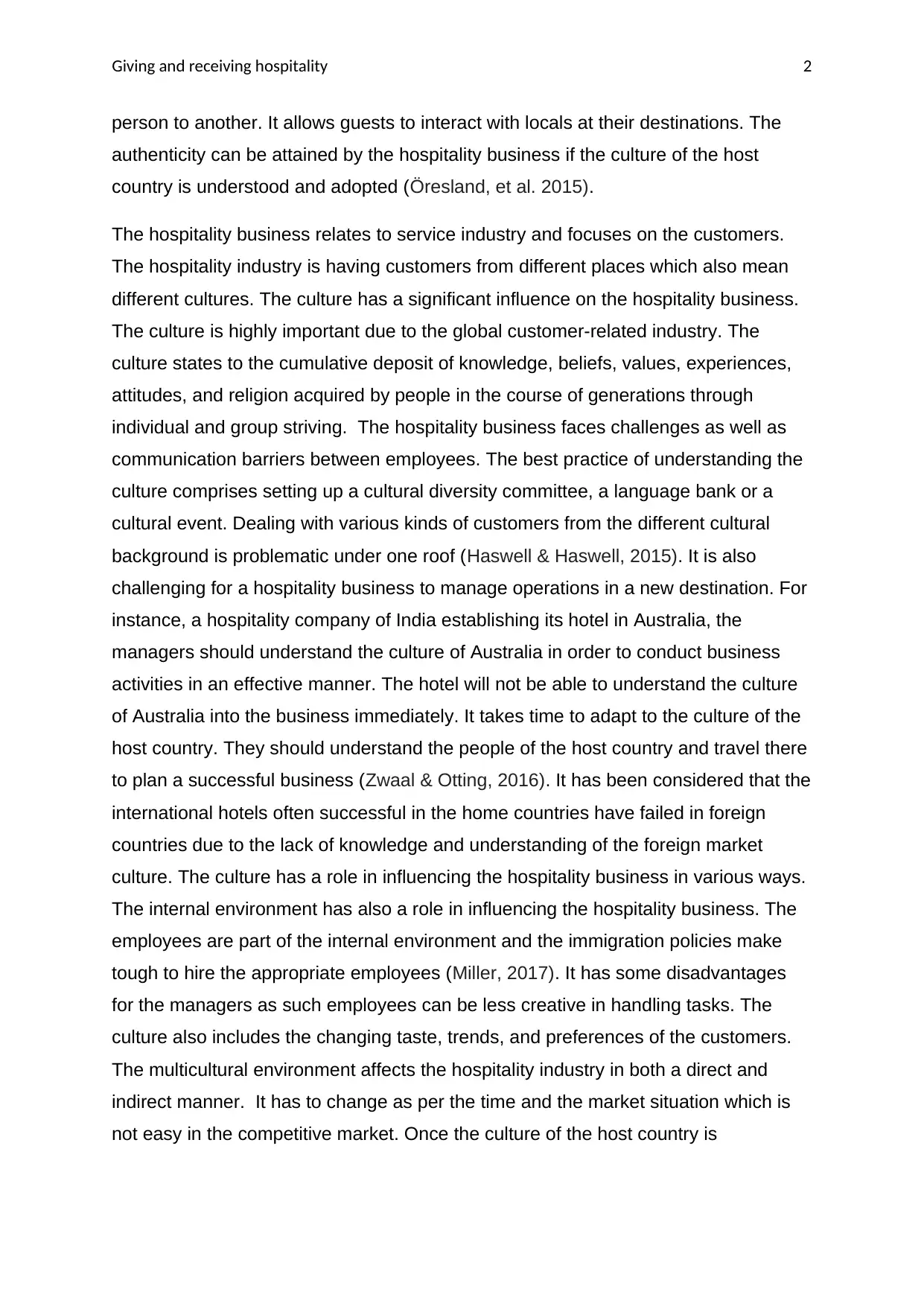
Giving and receiving hospitality 2
person to another. It allows guests to interact with locals at their destinations. The
authenticity can be attained by the hospitality business if the culture of the host
country is understood and adopted (Öresland, et al. 2015).
The hospitality business relates to service industry and focuses on the customers.
The hospitality industry is having customers from different places which also mean
different cultures. The culture has a significant influence on the hospitality business.
The culture is highly important due to the global customer-related industry. The
culture states to the cumulative deposit of knowledge, beliefs, values, experiences,
attitudes, and religion acquired by people in the course of generations through
individual and group striving. The hospitality business faces challenges as well as
communication barriers between employees. The best practice of understanding the
culture comprises setting up a cultural diversity committee, a language bank or a
cultural event. Dealing with various kinds of customers from the different cultural
background is problematic under one roof (Haswell & Haswell, 2015). It is also
challenging for a hospitality business to manage operations in a new destination. For
instance, a hospitality company of India establishing its hotel in Australia, the
managers should understand the culture of Australia in order to conduct business
activities in an effective manner. The hotel will not be able to understand the culture
of Australia into the business immediately. It takes time to adapt to the culture of the
host country. They should understand the people of the host country and travel there
to plan a successful business (Zwaal & Otting, 2016). It has been considered that the
international hotels often successful in the home countries have failed in foreign
countries due to the lack of knowledge and understanding of the foreign market
culture. The culture has a role in influencing the hospitality business in various ways.
The internal environment has also a role in influencing the hospitality business. The
employees are part of the internal environment and the immigration policies make
tough to hire the appropriate employees (Miller, 2017). It has some disadvantages
for the managers as such employees can be less creative in handling tasks. The
culture also includes the changing taste, trends, and preferences of the customers.
The multicultural environment affects the hospitality industry in both a direct and
indirect manner. It has to change as per the time and the market situation which is
not easy in the competitive market. Once the culture of the host country is
person to another. It allows guests to interact with locals at their destinations. The
authenticity can be attained by the hospitality business if the culture of the host
country is understood and adopted (Öresland, et al. 2015).
The hospitality business relates to service industry and focuses on the customers.
The hospitality industry is having customers from different places which also mean
different cultures. The culture has a significant influence on the hospitality business.
The culture is highly important due to the global customer-related industry. The
culture states to the cumulative deposit of knowledge, beliefs, values, experiences,
attitudes, and religion acquired by people in the course of generations through
individual and group striving. The hospitality business faces challenges as well as
communication barriers between employees. The best practice of understanding the
culture comprises setting up a cultural diversity committee, a language bank or a
cultural event. Dealing with various kinds of customers from the different cultural
background is problematic under one roof (Haswell & Haswell, 2015). It is also
challenging for a hospitality business to manage operations in a new destination. For
instance, a hospitality company of India establishing its hotel in Australia, the
managers should understand the culture of Australia in order to conduct business
activities in an effective manner. The hotel will not be able to understand the culture
of Australia into the business immediately. It takes time to adapt to the culture of the
host country. They should understand the people of the host country and travel there
to plan a successful business (Zwaal & Otting, 2016). It has been considered that the
international hotels often successful in the home countries have failed in foreign
countries due to the lack of knowledge and understanding of the foreign market
culture. The culture has a role in influencing the hospitality business in various ways.
The internal environment has also a role in influencing the hospitality business. The
employees are part of the internal environment and the immigration policies make
tough to hire the appropriate employees (Miller, 2017). It has some disadvantages
for the managers as such employees can be less creative in handling tasks. The
culture also includes the changing taste, trends, and preferences of the customers.
The multicultural environment affects the hospitality industry in both a direct and
indirect manner. It has to change as per the time and the market situation which is
not easy in the competitive market. Once the culture of the host country is
⊘ This is a preview!⊘
Do you want full access?
Subscribe today to unlock all pages.

Trusted by 1+ million students worldwide
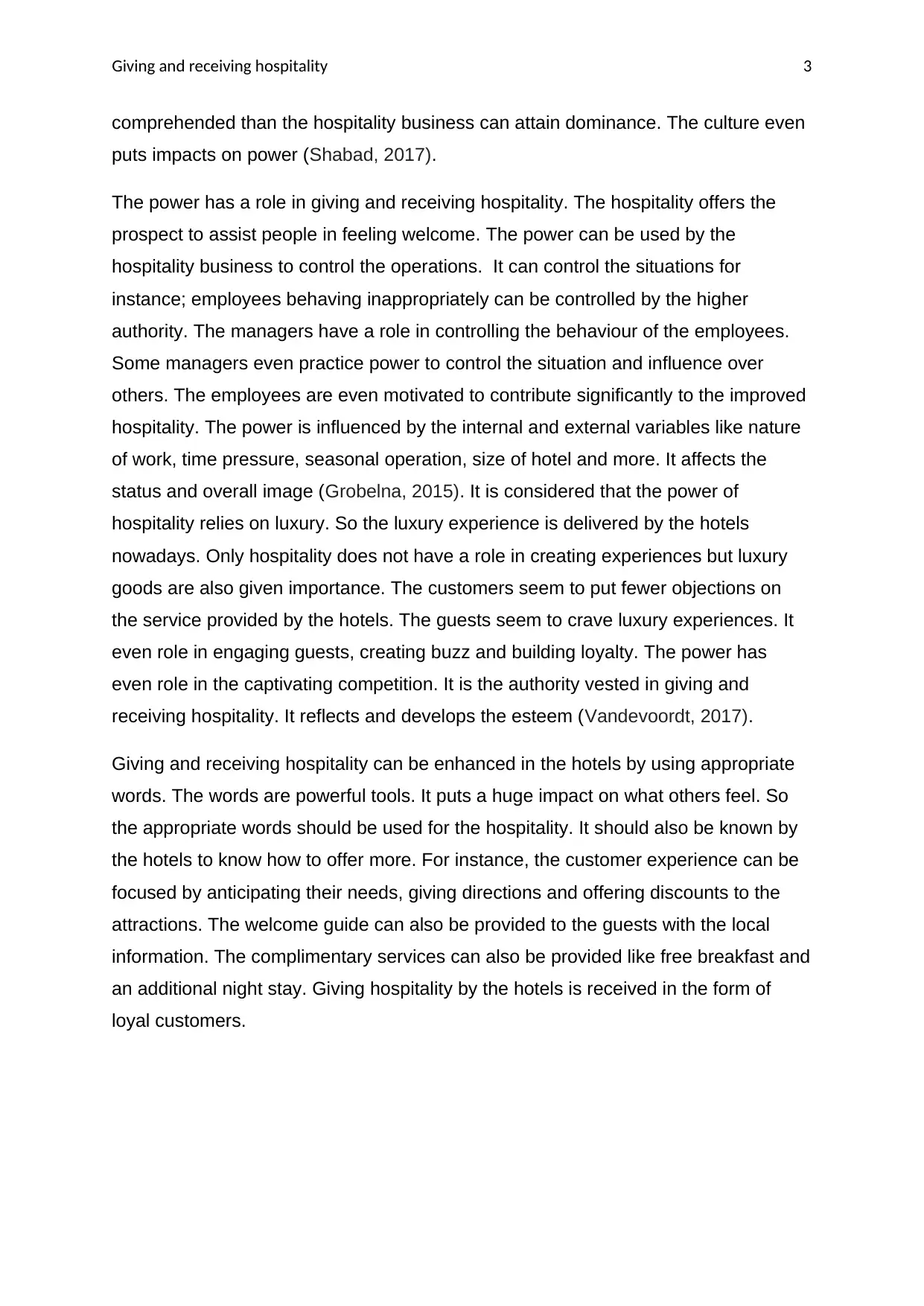
Giving and receiving hospitality 3
comprehended than the hospitality business can attain dominance. The culture even
puts impacts on power (Shabad, 2017).
The power has a role in giving and receiving hospitality. The hospitality offers the
prospect to assist people in feeling welcome. The power can be used by the
hospitality business to control the operations. It can control the situations for
instance; employees behaving inappropriately can be controlled by the higher
authority. The managers have a role in controlling the behaviour of the employees.
Some managers even practice power to control the situation and influence over
others. The employees are even motivated to contribute significantly to the improved
hospitality. The power is influenced by the internal and external variables like nature
of work, time pressure, seasonal operation, size of hotel and more. It affects the
status and overall image (Grobelna, 2015). It is considered that the power of
hospitality relies on luxury. So the luxury experience is delivered by the hotels
nowadays. Only hospitality does not have a role in creating experiences but luxury
goods are also given importance. The customers seem to put fewer objections on
the service provided by the hotels. The guests seem to crave luxury experiences. It
even role in engaging guests, creating buzz and building loyalty. The power has
even role in the captivating competition. It is the authority vested in giving and
receiving hospitality. It reflects and develops the esteem (Vandevoordt, 2017).
Giving and receiving hospitality can be enhanced in the hotels by using appropriate
words. The words are powerful tools. It puts a huge impact on what others feel. So
the appropriate words should be used for the hospitality. It should also be known by
the hotels to know how to offer more. For instance, the customer experience can be
focused by anticipating their needs, giving directions and offering discounts to the
attractions. The welcome guide can also be provided to the guests with the local
information. The complimentary services can also be provided like free breakfast and
an additional night stay. Giving hospitality by the hotels is received in the form of
loyal customers.
comprehended than the hospitality business can attain dominance. The culture even
puts impacts on power (Shabad, 2017).
The power has a role in giving and receiving hospitality. The hospitality offers the
prospect to assist people in feeling welcome. The power can be used by the
hospitality business to control the operations. It can control the situations for
instance; employees behaving inappropriately can be controlled by the higher
authority. The managers have a role in controlling the behaviour of the employees.
Some managers even practice power to control the situation and influence over
others. The employees are even motivated to contribute significantly to the improved
hospitality. The power is influenced by the internal and external variables like nature
of work, time pressure, seasonal operation, size of hotel and more. It affects the
status and overall image (Grobelna, 2015). It is considered that the power of
hospitality relies on luxury. So the luxury experience is delivered by the hotels
nowadays. Only hospitality does not have a role in creating experiences but luxury
goods are also given importance. The customers seem to put fewer objections on
the service provided by the hotels. The guests seem to crave luxury experiences. It
even role in engaging guests, creating buzz and building loyalty. The power has
even role in the captivating competition. It is the authority vested in giving and
receiving hospitality. It reflects and develops the esteem (Vandevoordt, 2017).
Giving and receiving hospitality can be enhanced in the hotels by using appropriate
words. The words are powerful tools. It puts a huge impact on what others feel. So
the appropriate words should be used for the hospitality. It should also be known by
the hotels to know how to offer more. For instance, the customer experience can be
focused by anticipating their needs, giving directions and offering discounts to the
attractions. The welcome guide can also be provided to the guests with the local
information. The complimentary services can also be provided like free breakfast and
an additional night stay. Giving hospitality by the hotels is received in the form of
loyal customers.
Paraphrase This Document
Need a fresh take? Get an instant paraphrase of this document with our AI Paraphraser
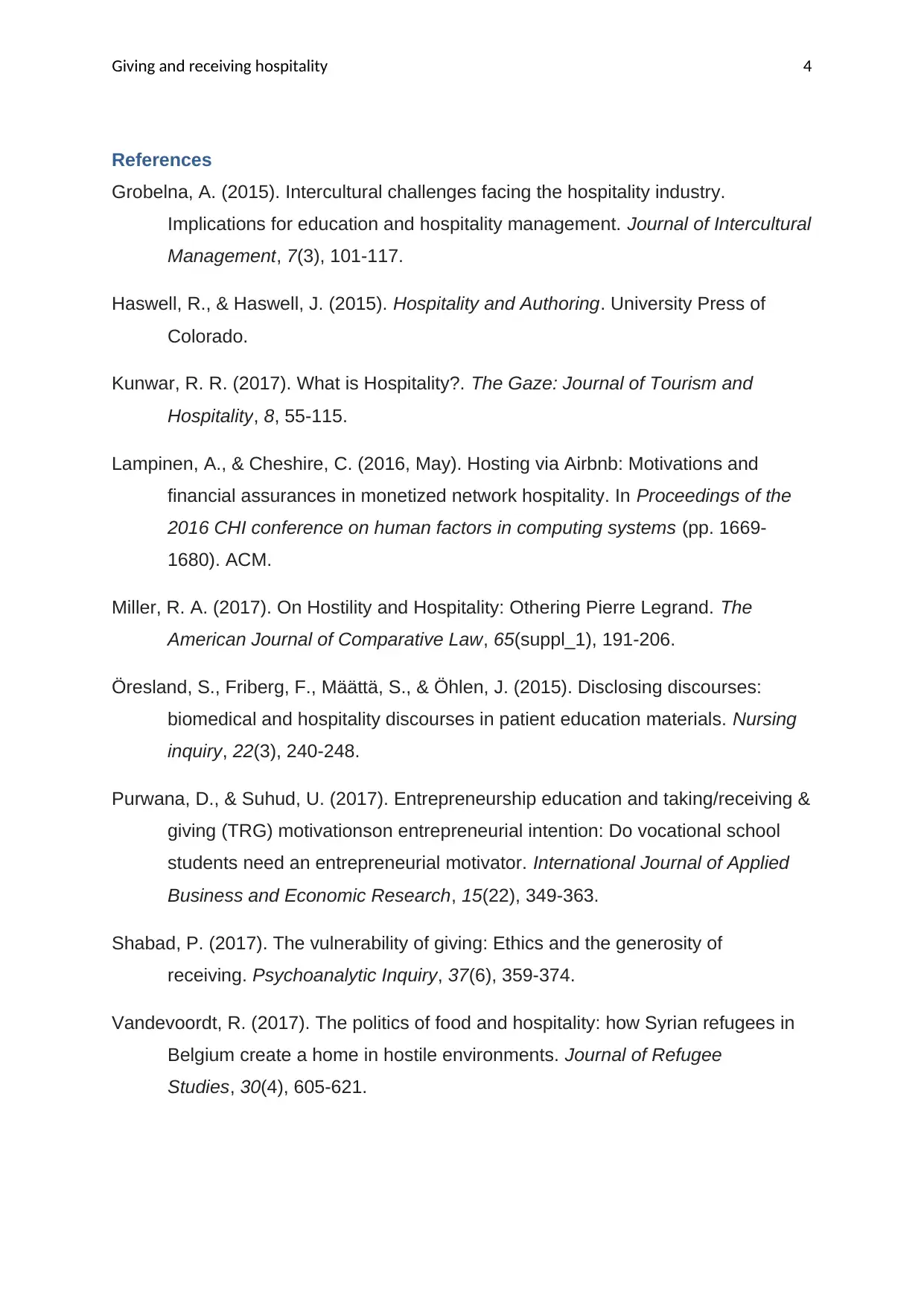
Giving and receiving hospitality 4
References
Grobelna, A. (2015). Intercultural challenges facing the hospitality industry.
Implications for education and hospitality management. Journal of Intercultural
Management, 7(3), 101-117.
Haswell, R., & Haswell, J. (2015). Hospitality and Authoring. University Press of
Colorado.
Kunwar, R. R. (2017). What is Hospitality?. The Gaze: Journal of Tourism and
Hospitality, 8, 55-115.
Lampinen, A., & Cheshire, C. (2016, May). Hosting via Airbnb: Motivations and
financial assurances in monetized network hospitality. In Proceedings of the
2016 CHI conference on human factors in computing systems (pp. 1669-
1680). ACM.
Miller, R. A. (2017). On Hostility and Hospitality: Othering Pierre Legrand. The
American Journal of Comparative Law, 65(suppl_1), 191-206.
Öresland, S., Friberg, F., Määttä, S., & Öhlen, J. (2015). Disclosing discourses:
biomedical and hospitality discourses in patient education materials. Nursing
inquiry, 22(3), 240-248.
Purwana, D., & Suhud, U. (2017). Entrepreneurship education and taking/receiving &
giving (TRG) motivationson entrepreneurial intention: Do vocational school
students need an entrepreneurial motivator. International Journal of Applied
Business and Economic Research, 15(22), 349-363.
Shabad, P. (2017). The vulnerability of giving: Ethics and the generosity of
receiving. Psychoanalytic Inquiry, 37(6), 359-374.
Vandevoordt, R. (2017). The politics of food and hospitality: how Syrian refugees in
Belgium create a home in hostile environments. Journal of Refugee
Studies, 30(4), 605-621.
References
Grobelna, A. (2015). Intercultural challenges facing the hospitality industry.
Implications for education and hospitality management. Journal of Intercultural
Management, 7(3), 101-117.
Haswell, R., & Haswell, J. (2015). Hospitality and Authoring. University Press of
Colorado.
Kunwar, R. R. (2017). What is Hospitality?. The Gaze: Journal of Tourism and
Hospitality, 8, 55-115.
Lampinen, A., & Cheshire, C. (2016, May). Hosting via Airbnb: Motivations and
financial assurances in monetized network hospitality. In Proceedings of the
2016 CHI conference on human factors in computing systems (pp. 1669-
1680). ACM.
Miller, R. A. (2017). On Hostility and Hospitality: Othering Pierre Legrand. The
American Journal of Comparative Law, 65(suppl_1), 191-206.
Öresland, S., Friberg, F., Määttä, S., & Öhlen, J. (2015). Disclosing discourses:
biomedical and hospitality discourses in patient education materials. Nursing
inquiry, 22(3), 240-248.
Purwana, D., & Suhud, U. (2017). Entrepreneurship education and taking/receiving &
giving (TRG) motivationson entrepreneurial intention: Do vocational school
students need an entrepreneurial motivator. International Journal of Applied
Business and Economic Research, 15(22), 349-363.
Shabad, P. (2017). The vulnerability of giving: Ethics and the generosity of
receiving. Psychoanalytic Inquiry, 37(6), 359-374.
Vandevoordt, R. (2017). The politics of food and hospitality: how Syrian refugees in
Belgium create a home in hostile environments. Journal of Refugee
Studies, 30(4), 605-621.
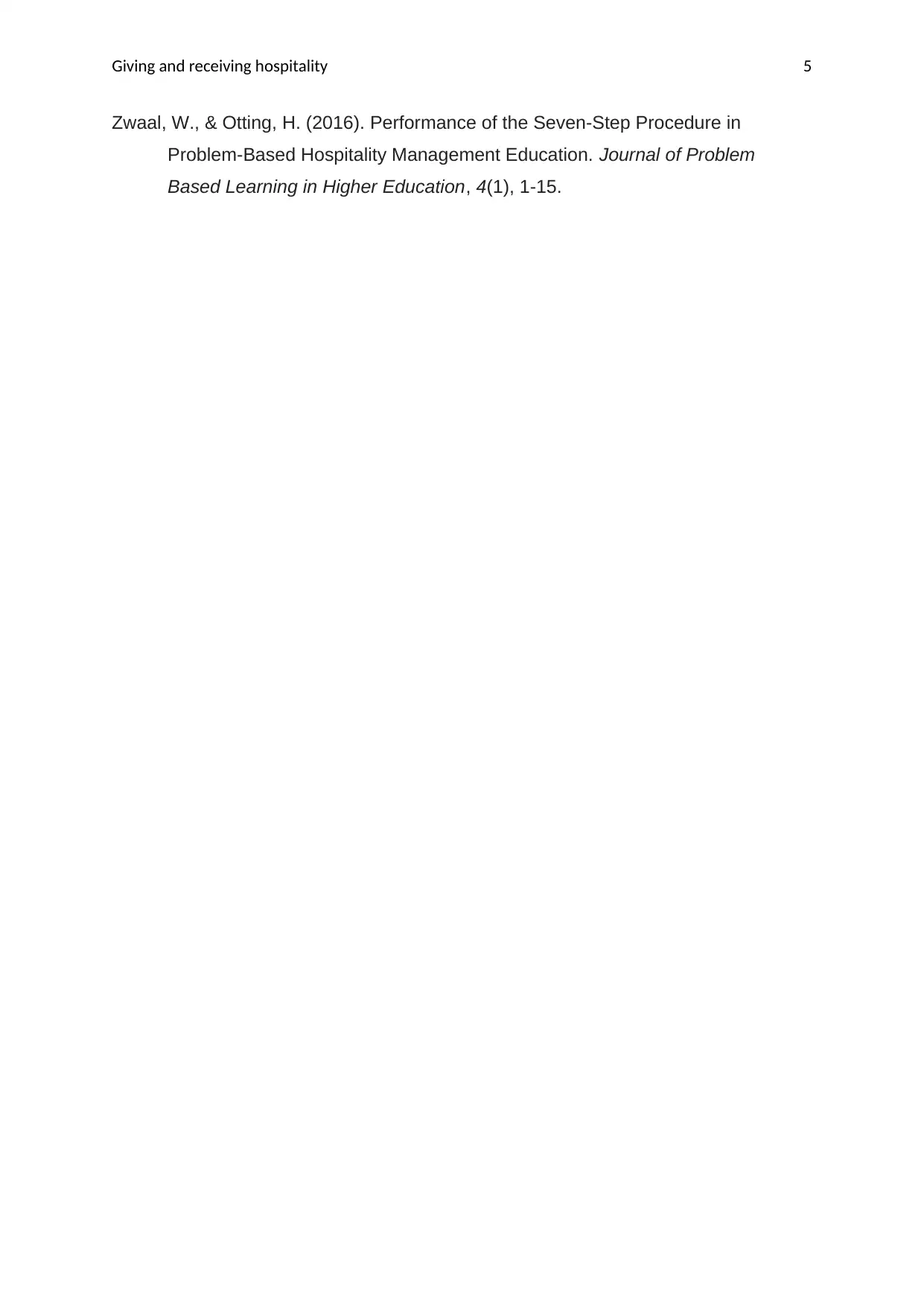
Giving and receiving hospitality 5
Zwaal, W., & Otting, H. (2016). Performance of the Seven-Step Procedure in
Problem-Based Hospitality Management Education. Journal of Problem
Based Learning in Higher Education, 4(1), 1-15.
Zwaal, W., & Otting, H. (2016). Performance of the Seven-Step Procedure in
Problem-Based Hospitality Management Education. Journal of Problem
Based Learning in Higher Education, 4(1), 1-15.
⊘ This is a preview!⊘
Do you want full access?
Subscribe today to unlock all pages.

Trusted by 1+ million students worldwide
1 out of 6
Related Documents
Your All-in-One AI-Powered Toolkit for Academic Success.
+13062052269
info@desklib.com
Available 24*7 on WhatsApp / Email
![[object Object]](/_next/static/media/star-bottom.7253800d.svg)
Unlock your academic potential
Copyright © 2020–2026 A2Z Services. All Rights Reserved. Developed and managed by ZUCOL.





